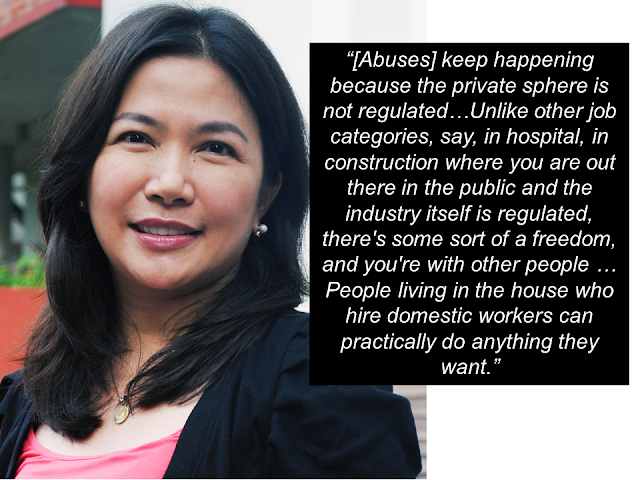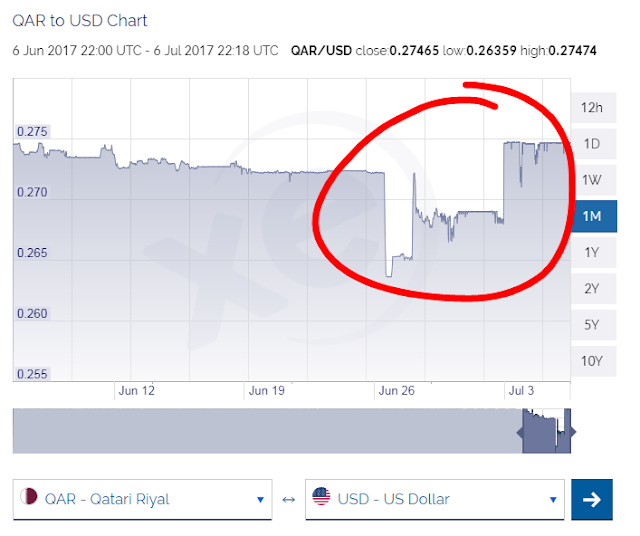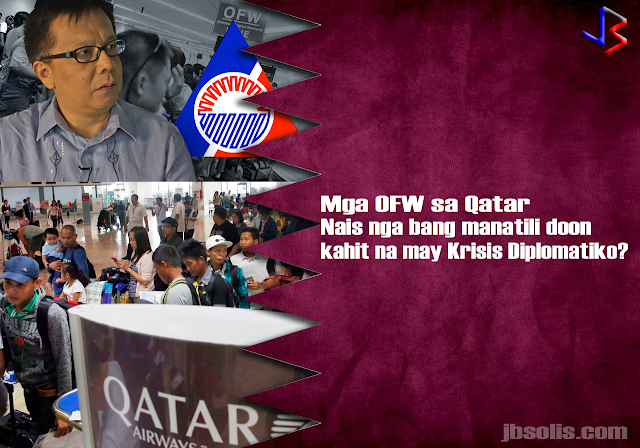The kafala or sponsorship system is a system used in monitoring migrant laborers who are working primarily in the construction and domestic sectors in Middle Eastern countries such as Bahrain, Iraq, Jordan, Lebanon, Kuwait, Oman, Qatar, Saudi Arabia, and the UAE. Attributed to modern-day slavery that puts expatriate workers including overseas Filipino workers (OFW) deployed as household service workers (HSW) vulnerable to abuse and maltreatment.
Ads
Sponsored Links
An article that was written in Akhbrna claimed that a reliable source said that Saudi Arabia on its effort for the development of human resources will be giving a number of professionals mentioned under the certain sector permanent residence.
Saudi Arabia issued a resolution on the granting of permanent residence 5 years renewable for a number of Arab nationalities.
The source also confirmed that the sponsorship for more than 24 professions was already canceled. The Kingdom announced new decisive measures to replace the sponsorship system for certin professions, the article added.
Which had long awaited the establishment of an easier system for their lives instead of the system of injustice suffered by some residents due to the persecution of some of their sponsors, after the Kingdom confirmed the preservation of all the rights of residents inside?
Saudi sources said that Saudi Arabia is only a few steps away from putting an alternative to the guarantor system in the Kingdom, and not only that but will take decisive measures to cancel the sponsorship of a number of occupations occupied by some residents in the Kingdom including the following:
Workshop workers.
Supply workers.
Craftsmen.
Employees in the field of contracting.
The Kingdom gave all residents of the Kingdom and any expatriates the possibility of transferring bail alone in some cases to eliminate the persecution of the sponsor to some residents.
After giving the opportunity to a number of expatriates to work without the need for a sponsor in the Kingdom, especially the administrative professions, engineering professions, and doctor's profession, considering that this opportunity is a bold step from the Kingdom in order to develop an alternative to the sponsorship system.
Thank you for following up on our news and we promise you always and never to provide everything that is better and new. We also promise to transfer all news from all news sources and facilitate reading it with credibility and transparency.
Ads
Meanwhile, the contracts of more than 71% expats working in government jobs have been terminated based on the decision of the Council of Ministers,
The Ministry of Civil Service will find qualified Saudis to fill vacancies created by the termination of contracts of expat workers.
According to statistics of the Ministry of Civil Service, the education and health sectors are still attracting expat workers.
Some 91% of expat workers in government jobs are employed in the education and health sectors.
There were about 60,000 expatriates working in the public sector last year, according to a statistical report by the Saudi Arabian Monetary Authority (SAMA).
The report said the total number of government employees — Saudis and non-Saudis — was 1.23 million with a drop of about 0.8 percent over their number in the previous year.
It said the number of Saudi women holding government jobs increased by about 0.4 percent to reach 476,000 compared to 697,000 men whose number decreased by about 0.95 percent compared to 2016.
SAMA said Saudis constituted 95.1 percent of government employees while male expatriates were 4.9 percent reaching 29,600 with a decrease of about 12.7 percent over their number the previous year. The report said non-Saudi women workers were 30,800 with a decrease of about 7.3 percent over their number in 2016.
There were 474,153 Saudi women government employees in 2016 whose number went up slightly in 2017 to reach 476,347.
Filed under the category of kafala , sponsorship system, Bahrain, Iraq, Jordan, Lebanon, Kuwait, Oman, Qatar, Saudi Arabia, UAE, modern-day slavery, expatriate workers , overseas Filipino workers, household service workers , abuse , maltreatment.
©2018 THOUGHTSKOTO










![Philippine Government Urges OFWs To Avoid Working In Saudi And Qatar DOLE Secretary Silvestre Bello III directed the Philippine Overseas Employment Administration (POEA) and Bureau of Local Employment (BLE) through an administrative order, to undertake a supply-demand profiling and skills-job matching of Filipino workers in Saudi Arabia and Qatar. “We will review the conditions of our overseas workers in other countries, like Saudi Arabia, Qatar, Bahrain, Jeddah, and other parts of the Middle East. Kailangan i-review naming ‘yan. In fact, we will be seeking a revisiting of the existing bilateral agreements with these countries. We want these agreements to provide maximum and optimum protection to our OFWs,” he said. Advertisement Sponsored Links The Philippine government is encouraging thousands of overseas foreign workers (OFWs), who lost their jobs or were displaced by events unfolding in Saudi Arabia and Qatar, to seek opportunities elsewhere. According to Silvestre Bello III, Philippine Labour Secretary, the government is working on convincing Filipino workers in Saudi Arabia and Qatar “to return home or be employed elsewhere overseas.” Earlier on Thursday, Bello said that the Philippines may be forced to restrict Filipinos from getting jobs, particularly employment as maids, in certain Middle East countries if abuses against them persist. Bello said the government is contemplating the possibility of a deployment ban of Filipino maids and other workers in Saudi Arabia if the kingdom can “not impose stronger protective mechanisms to ensure the safety and welfare of our workers there.” As for Qatar, Filipino workers there are also under pressure due to the diplomatic row between Doha and Gulf Cooperation Council (GCC) member countries. “This is what the Labour Department intends to do [entice Filipinos in Qatar and Saudi Arabia to return to the Philippines] with the establishment of a Job Fair Task Force that will conduct a special job fair and skills profiling of OFWs [Overseas Filipino Workers] based in these two countries,” Bello said. In an administrative order, Bello directed the Philippine Overseas Employment Administration (POEA) and Bureau of Local Employment (BLE) to undertake a supply-demand profiling and skills-job matching of Filipino workers in Saudi Arabia and Qatar. Saudi Arabia is a top destination for OFWs, employing more than a million Filipino skilled workers and professionals as well as house maids. Bello said that OFWs that require further upgrading of skills according to the requirements of participating employers will be referred to the Technical Education and Skills Development Authority (TESDA) for training prior to their deployment — whether locally or overseas. This report comes on the heels of a steady stream of repatriations of Filipino workers from Kuwait. Every week, hundreds of workers from that country arrive in the Philippines after awaiting months of working on their repatriation papers. The Philippines had also prohibited its workers, specifically those on “new contract”, from leaving for jobs in Kuwait following reports over the death of Joanna Demafelis, a Filipino housemaid whose remains were found stored inside a freezer at the home of her former employers. The suspects — a married couple — are both non-Kuwaiti Arab nationals. Read More: Beware Of Fake Online Registration System Which Collects $10 From OFWs— POEA Is It True, Duterte Might Expand Overseas Workers Deployment Ban To Countries With Many Cases of Abuse? Do You Agree With The Proposed Filipino Deployment Ban To Abusive Host Countries? ©2018 THOUGHTSKOTO www.jbsolis.com](https://blogger.googleusercontent.com/img/b/R29vZ2xl/AVvXsEjrxrrMuY3dYl8Zgrre0yAJG0i-8jVuACzJPpHA0pDBq7TPppy2m6tYacQIvdP0GRTchpb9ZJpkNT4a-m_hxFVAQDUzKdLlgyZ_t7lk4GqVX1wp5jL9_xdg2Xkh0p9vG0D35zqr0w/s640/%2524%2524%2524%2524%2524%2524%2524%2524%2524%2524%2524%2524%2524%2524%2524.png)







![July 01, 2017 - New traffic rules and fines come into effect today in the UAE. Senior police officials are confident that these will will reduce the number of deaths on the roads and that the results will be seen after the law's implementation. The [new] law is more harsh and has tough punishments for dangerous offences like reckless driving, using the phone when driving and speeding,” Major-General Mohammad Saif Al Zafein said. He is the director of the Director of the Federal Traffic Council. He clarified that the main purpose of the law, which came into effect July 1, is to make roads safer and not to make more money from motorists. The list of violations and their corresponding fines are listed below Generally, motorists believe that any increase in traffic fines aims to collect more money but that’s not the truth. Under the new law, fines for some offences have been reduced. "People need a strong deterrent to prevent them from violating [traffic rules]. When there is a large sum of money [as fines], they will think many times before breaking the rule because no one wants to spend his earnings on traffic fines. I am sure that as soon as the new traffic law is implemented, we will see a reduction in road fatalities," according to Major Abdul Rahman Khatr, director of the Traffic Awareness branch at Sharjah Police. Officials point out that most traffic accidents occur when motorists fail to abide by the traffic rules — be it regarding speed limits, respecting the red signal, overtaking from the wrong side or using the hard shoulder to overtake. Currently, there are over 200 different fines you could get on the roads in the UAE. Below is the list of violations and the corresponding penalties. VIOLATIONS FINE BLACK POINTS Vehicle confiscated / Days 1 Driving under the influence of alcohol Decided by court 23 90 2 Driving under the influence of drugs or similar substances. Decided by court License to be suspended for 1 year from the date of punishment completion 60 3 Driving a vehicle without number plates. Dh3000 23 90 4 Driving a heavy vehicle in a way that endangers his or other people’s lives, harms public or private properties, jumping the red light, causing his or another vehicle to overturn Dh3000 License to be suspended for 1 year 5 Heavy vehicle not abiding by lane discipline. Dh1500 12 6 Driving a heavy vehicle that does not comply with safety and security conditions. Dh2000 6 7 Loading a heavy vehicle in a way that may cause danger to others or to the road. Dh2000 6 8 Entering road dangerously. Dh600 6 9 Causing death of others. Decided by court 23 60 10 Not stopping after causing an accident that resulted in injuries with a light vehicle. Dh500 8 7 11 Not stopping after causing an accident that resulted in injuries with a heavy vehicle. Dh1000 16 12 Failure for light vehicle to stop after causing an accident Dh500 8 7 13 Failure for heavy vehicle to stop after causing an accident Dh1000 16 15 Exceeding maximum speed limit by more than 80km/hr for light vehicles Dh3000 23 60 14 Exceeding maximum speed limit by more than 60km/hr. Dh2000 12 30 25 Exceeding maximum speed limit by not more than 60km/hr. Dh1500 6 15 26 Exceeding maximum speed limit by not more than 50km/hr. Dh1000 29 Exceeding maximum speed limit by not more than 40km/hr. Dh700 31 Exceeding maximum speed limit by not more than 30km/hr. Dh600 37 Exceeding maximum speed limit by not more than 20km/hr. Dh300 17 Driving in a way that endangers people Dh2000 23 60 18 Jumping a red light for light vehicles Dh1000 12 30 19 Jumping a red light for motor bikes Dh800 4 30 20 Running away from a traffic policeman in a light vehicle Dh800 12 30 21 Running away from a traffic policeman in a heavy vehicles Dh1000 16 22 Dangerous overtaking by heavy vehicles where it's prohibited Dh3000 1 year 23 Causing a car to overturn by heavy vehicles Dh3000 1 year license suspension 24 Causing serious injuries. Decided by court 23 30 27 Overtaking on the hard shoulder. Dh1000 6 28 Overtaking from a prohibited place. Dh600 30 Parking in fire hydrant places, spaces allocated for people with special needs and ambulance parking. Dh1000 6 32 Driving against traffic. Dh600 4 33 Allowing children under 10 years old or shorter 145 cm to sit in the front seat of a vehicle. Dh400 34 Failure to fasten seat belt while driving for all passengers. Dh400 4 35 Failure to leave a safe distance. Dh400 4 36 Failure to follow the directions of the policeman. Dh400 4 38 Entering a road without ensuring that it is clear. Dh400 4 39 Exceeding permitted level of car window tinting. Dh1500 40 Not giving way to emergency, police and public service vehicles or official convoys. Dh1000 6 41 Driving a noisy vehicle. Dh2000 6 42 Allowing others to drive a vehicle for which they are unlicensed. Dh500 7 43 Overload or protruding load from a heavy vehicle without permission. Dh3000 12 44 Driving a vehicle that causes pollution. Dh1000 6 45 Stopping on the road for no reason. Dh1000 6 46 Stopping on a yellow box. Dh500 47 Not giving pedestrians way on pedestrian crossings. Dh500 6 48 Failure to abide by traffic signs and directions. Dh500 49 Throwing waste from vehicles onto roads. Dh1000 6 50 Stopping vehicle on the left side of the road in prohibited places. Dh1000 51 Stopping vehicle on pedestrian crossing. Dh500 52 Teaching driving in a training vehicle that does not bear learning sign. Dh500 53 Teaching driving in a non-training vehicle without permission from licensing authority. Dh500 54 Placing marks on the road that may damage the road or block traffic. Dh500 55 Operating industrial, construction and mechanical vehicles and tractors without permission Dh500 7 56 Modifying vehicle’s engine without permission. Dh1000 12 30 57 Changing vehicle’s color without permission. Dh800 59 Driving with a driving license issued by a foreign country except in permitted cases. Dh400 61 Parking behind vehicles and blocking their movement. Dh500 62 Towing a vehicle or a boat with an unprepared vehicle. Dh1000 64 No lights on the back or sides of trailer container. Dh400 2 65 Lights on the back or sides of container not working. Dh400 6 66 Taxis, which have designated pickup areas, stopping in undesignated places. Dh500 4 67 Prohibited entry of heavy vehicles Dh1000 4 68 Blocking traffic Dh500 69 Vehicle unfit for driving. Dh500 7 70 Driving a light vehicle that does not comply with safety and security conditions. Dh200 7 71 Not lifting exhaust of trucks. Dh1500 72 Not covering loads of trucks. Dh3000 74 Heavy vehicle prohibited entry. Dh1000 4 75 Violating loading or unloading regulations in parking. Dh1000 4 76 Carrying and transporting passengers illegally. Dh3000 24 30 77 Writing phrases or placing stickers on vehicle without permission. Dh500 78 Not taking road safety measures during vehicle breakdowns Dh500 79 U turn from undesignated areas of incorrectly Dh500 4 80 Loading a light vehicle in a way that may pose a danger to others or to the road. Dh500 4 81 Stopping vehicle without keeping the distance specified by the law from a curve or junction. Dh500 82 Transporting passengers by vehicle undesignated for this purpose. Dh1000 4 83 Sudden swerve. Dh1000 4 84 Driving on lanes meant for buses or taxis Dh400 85 Driving a taxi without required license. Dh200 4 86 Carrying passengers in driving training vehicle. Dh200 4 87 Driving a taxi with an expired warranty. Dh200 88 Reversing dangerously. Dh400 4 89 Taxi refusing to carry passengers. Dh200 4 90 Parking illegally Dh500 91 Parking in loading and offloading areas Dh200 92 Parking on the left hand shoulder of road in prohibited areas Dh1000 93 Parking without securing the car Dh500 94 Using multi-colored lights. Dh200 95 Not wearing helmet while driving motorbike. Dh500 4 96 Exceeding passenger limit. Dh500 4 7 97 Expired tires Dh500 4 7 98 Driving with an expired registration Dh500 4 7 (if registration expired more than 3 months) 99 Driving unlicensed vehicle. Dh5 00 100 Violation of laws of using commercial number plates. Dh500 7 101 Light vehicle dropping or spilling load Dh500 103 Driving with one number plate or faded numbers on plate Dh400 104 Driving at night or in foggy weather without lights. Dh500 4 106 Not fixing reflective stickers at the back of trucks and heavy vehicles. Dh500 107 Not using indicators when changing direction or turning. Dh400 108 Not giving way for vehicles to pass on the left. Dh400 113 Overtaking dangerously Dh600 6 114 Driving an unlicensed vehicle. Dh500 4 7 119 Parking vehicles on pavement. Dh400 129 Driving below minimum speed limit. Dh400 131 Using hand-held mobile phone while driving or being distracted in any way Dh800 4 138 Using horn in a disturbing way. Dh400 4 140 Failure to hand over a driving license when the maximum black points are accrued in the first traffic violation Dh1000 141 Failure to hand over a driving license when the maximum black points are accrued in the second traffic violation Dh2000 142 Failure to hand over a driving license when the maximum black points are accrued in the third traffic violation Dh3000 143 Failure to pick up confiscated car once the confiscation period is over Dh50 a day maximum of Dh3000 144 Failure to pick up confiscated heavy vehicle once the confiscation period is over Dh100 a day, maximumDh3000 145 Overloading a light vehicle Dh500 4 146 Driving school vehicles in times and areas that are prohibited Dh400 147 Teaching someone to drive in a car that is not labeled as learning vehicle, or teaching without a license Dh500 148 Not presenting a learners permit Dh300 149 Broken or absence of back or sidelights on the tow truck Dh500 4 150 Participating in a motorcade without a permit Dh500 4 15 151 Pedestrian’s failure to abide by signals, or crossing from undesignated areas Dh400 152 School bus driver failing to activate the stop sign or abide by traffic instructions Dh500 6 153 Driver failing to stop when the bus drivers activates the stop sign. Dh1000 10 154 Using a leisure bike with three or more wheels Dh3,000 90 155 Transporting inflammable ale or dangerous materials without permission Dh3,000 24 60 156 Failure to take safety precautions when the car breaks down Dh500 157 Failure to get the car technically tested after any major engine or chassis modifications Dh400 158 Broken Car lights Dh400 6 159 Disregarding policeman’s instructions Dh400 4 160 Failure to fix child seats for children under 4 years Dh400 161 Failure to give priority to emergency , police and protocol vehicles Dh1000 6 162 Stopping at Zebra crossings Dh500 163 Stopping vehicles and road turns Dh500 164 Parking in a way without securing the car Dh500 165 Parking on pavements Dh400 166 Writing or posting on the vehicle without a permit Dh500 167 Failure to abide by traffic signs Dh500 168 Littering from vehicle windows while driving Dh1000 6 169 Rubber neck and crowds at the scenes of traffic accident Dh1000 170 Driving a heavy vehicle dangerously in a way that endangers his or other people’s lives Dh3,000 License to be suspended for one year 171 Driving a heavy vehicle in a way that harms public or private properties Dh3,000 License to be suspended for one year 172 Heavy vehicle jumping the red light Dh3,000 License to be suspended for one year 173 Heavy vehicle causing his or another vehicle to overturn Dh3,000 License to be suspended for one year 174 Driving industrial, construction and mechanical equipment without a license Dh1,500 175 Heavy vehicle overtaking in areas where it is prohibited Dh3,000 License to be suspended for one year 176 Driving a heavy vehicle that does not abide by safety standards Dh2,000 6 177 A driving an uninsured vehicle Dh500 4 7 178 Driving a vehicle on a different license for a different type of vehicle Dh400 12 179 Driving a vehicle that does not abide by safety standards Dh500 180 Driving a vehicle that is unfit for driving Dh500 181 Driving a vehicle at below the minimum speed set for the road (if any) Dh400 Previous fines as of February 2016 (Some are revised as of July 1) 182 Not fixing number plates in designated places. Dh200 2 183 Exceeding maximum speed limit by not more than 10km/hr. Dh400 184 Violating the terms of the driving license. Dh300 185 Leaving a vehicle on the road with its engine running. Dh300 186 Using vehicle for purposes other than designated. Dh200 4 7 187 Using un-matching number plates for trailers and containers. Dh200 188 Stopping a vehicle in a way that may pose danger or block traffic. Dh200 3 189 Using training vehicles outside of timings specified by licensing authority. Dh200 190 Using training vehicles in places not designated by licensing. Dh200 191 Abuse of parking space. Dh200 3 192 Violating tariff. Dh200 6 193 Not showing vehicle registration card when required. Dh200 194 Not showing driving license when required. Dh200 195 Not fixing taxi sign where required. Dh200 196 Not fixing a sign indicating licensed overload. Dh200 3 197 Using interior lights for no reason while driving. Dh100 198 Failure to abide by specified color for taxis or training cars. Dh200 199 Failure to display tariff of buses or taxis or not showing them when required. Dh200 200 Broken lights. Dh200 6 201 Using horn in prohibited areas. Dh200 2 202 Failure to keep taxis and buses clean inside and outside. Dh200 203 Not abiding by taxi drivers obligatory uniform or not keeping it in good condition. Dh100 204 Smoking inside taxis and buses. Dh200 205 Calling on passengers in the presence of signs. Dh100 206 Not displaying truck’s load on both sides. Dh100 207 Driving without spectacles or contact lenses. Dh100 208 Not using interior light in buses at night. Dh100 209 Opening left door of taxi. Dh100 3](https://blogger.googleusercontent.com/img/b/R29vZ2xl/AVvXsEip7C4mP7HDiPIfUzPC7Qz8ydA8Wuitidkhan5M82mkcskxYj6ak5z0L1NoI5lQcLmVozcXU9E8w7k6yC31tEkVBcnCg3h1fi7Qsgi4zqjdSoHoZTYRN-UazuhILcmGgRaXRa5R/s640/template.png)

